Ginseng, a well-known herb in traditional medicine, has recently garnered recognition for its possible anti-aging skincare benefits. This ancient botanical element is thought to have a variety of characteristics that can help rejuvenate the skin and fight the effects of aging. However, while there is some evidence to support these claims, additional research is required to completely grasp the degree of ginseng's effects on the skin. If you want to use ginseng-based skincare products, proceed with caution and consider seeing a skincare professional for personalised guidance.
Ginseng in Skincare: An Overview
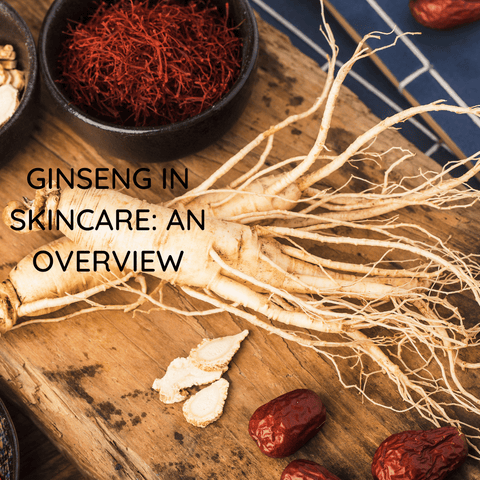
Ginseng, a beloved herb in traditional medicine, is gaining popularity in the beauty market due to its potential advantages. This botanical element, produced from the roots of numerous plant species in the Panax genus, has a long history of therapeutic usage in Asian cultures. However, while ginseng can be a useful element, individual outcomes may vary, and more research is needed to completely understand its benefits on the skin. Consider ginseng-based skincare products as part of a comprehensive skincare regimen suited to your skin's needs.
What is Ginseng and Its Historical Use in Skincare
Ginseng is a perennial plant known for its fleshy roots, which have traditionally been used for medicinal purposes. It is a member of the Panax genus and can be found in Asia, North America, and Siberia. Ginseng comes in a variety of varieties, the most well-known of which are Panax ginseng (Asian ginseng) and Panax quinquefolius (American ginseng). Because of their possible health benefits, these plants have been highly prized in traditional medicine for generations. Ginseng has a long history of use in several cultures, particularly in East Asian traditional medicine systems like Chinese and Korean traditional medicine. Because of its claimed revitalising and life-extending powers, it was considered a "superior" plant and was frequently kept for emperors and the affluent elite. Ginseng was thought to bring vitality, stamina, immune system support, and overall well-being. Ginseng was traditionally consumed in the form of teas, tonics, and powders. It was also utilised topically in various preparations for its potential skin advantages.
Different Types of Ginseng in Skincare Products
For their potential benefits, various varieties of ginseng are used in skincare products. Each species of ginseng has its own set of ingredients and qualities that can help with various elements of skincare. Panax ginseng (asian ginseng), Panax quinquefolius (american ginseng), Panax notoginseng, Siberian ginseng (eleuthero), Red ginseng, and Wild ginseng are some of the most frequent forms of ginseng used in skincare products. Consider the type of ginseng used and the expected advantages when selecting ginseng-containing skincare products. It's important to remember that the efficacy of ginseng-based treatments might vary depending on aspects including concentration, formulation quality, and individual skin features. Furthermore, it is critical to carefully check the ingredient list to ensure that the product contains ginseng or ginseng extract. Some items may claim to include ginseng but merely contain trace levels, limiting their potential advantages.
Unveiling the Anti-Aging Properties of Ginseng
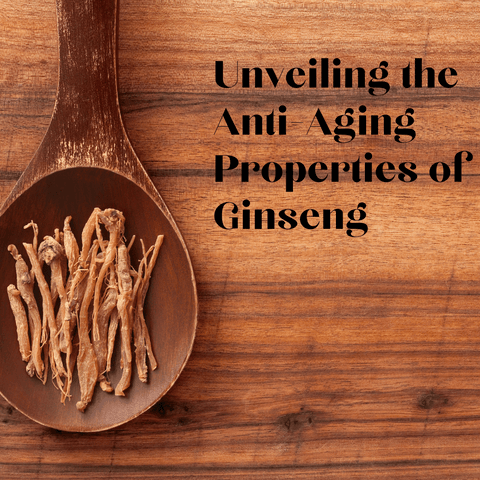
Ginseng, a beloved herb in traditional medicine, has received interest in skincare for its potential anti-aging benefits. While more research is needed to fully understand the extent of ginseng's effects on ageing skin, there is growing evidence that it may provide antioxidant protection, collagen stimulation, wrinkle reduction, skin regeneration, moisturization and hydration, anti-inflammatory effects, radiance enhancement, UV protection, and damage reduction. It is critical to use ginseng-based skincare products as part of a comprehensive skincare regimen. While ginseng seems promising, no single substance can address every facet of aging skin. Combining ginseng with other well-known anti-aging substances such as hyaluronic acid, retinoids, vitamin C, and peptides can provide a more comprehensive approach to combating various indications of aging. Furthermore, because individual reactions to skincare products fluctuate, results may vary from person to person. Consistency in product use and patience are essential, as obvious changes may take many weeks or even months to become apparent.
Ginseng's Antioxidant and Anti-Inflammatory Benefits
Ginseng, a plant root utilised in traditional medicine for millennia, is thought to have a variety of health advantages due to its antioxidant and anti-inflammatory qualities. These properties are regarded as beneficial in skincare as well. Here's how ginseng's antioxidant and anti-inflammatory properties can help with skin health:
Antioxidant Benefits:
-
Neutralizing Free Radicals: Ginseng contains substances with high antioxidant capabilities, such as ginsenosides and polyphenols. Free radicals, which are unstable chemicals produced by conditions like UV radiation, pollution, and stress, are neutralised by antioxidants. Free radicals can harm skin cells and cause premature aging, wrinkles, and dullness.
-
Protection Against Oxidative Stress: Ginseng's antioxidants help protect skin cells from oxidative stress by scavenging free radicals. This protection can help to reduce the breakdown of collagen and elastin fibres, which are necessary for skin firmness and elasticity.
-
Photoaging Prevention: UV radiation from the sun is a key source of free radicals, which damage skin cells and cause photoaging (sun-induced premature aging). The antioxidant properties of ginseng may help minimise the effects of UV-induced oxidative stress on the skin.
Anti-Inflammatory Benefits:
-
Calming Irritation: The sun's UV radiation is a major source of free radicals, which damage skin cells and cause photoaging (sun-induced premature aging). Ginseng's antioxidant qualities may aid in reducing the effects of UV-induced oxidative stress on the skin.
-
Reduce Puffiness: Inflammation can cause fluid retention and puffiness. Ginseng's anti-inflammatory properties may aid in the reduction of puffiness around the eyes and other areas of the face.
-
Managing Skin Conditions: Acne, eczema, and psoriasis all involve inflammation. While ginseng is not a direct treatment, its anti-inflammatory properties may help manage these conditions by alleviating some symptoms.
-
Improving Overall Complexion: Inflammation can cause uneven skin tone and texture. By calming inflammation, ginseng may contribute to a more even and healthier-looking complexion.
How Ginseng Enhances Skin Elasticity and Firmness
Ginseng is said to improve skin elasticity and firmness by combining its bioactive ingredients and their effects on the skin. While additional research is needed to completely understand the mechanisms underlying these advantages, here's how ginseng may help with skin elasticity and firmness:
-
Collagen Stimulation: Collagen is a protein that gives the skin structure, support, and flexibility. Collagen production normally declines as we age, resulting in a loss of skin firmness and the appearance of wrinkles. Ginseng is known to stimulate collagen formation, which can help maintain the structural integrity and flexibility of the skin. Ginsenosides, the active components found in ginseng, are thought to aid in collagen formation. These chemicals may stimulate fibroblast activity, which is important for the production of collagen and other skin structural components. Ginseng can help produce smoother and more robust skin by enhancing collagen production.
-
Antioxidant Protection: The antioxidant effects of ginseng are also important for skin elasticity and suppleness. Antioxidants protect collagen and elastin fibres from free radical oxidative stress. Free radicals degrade these supporting fibres, resulting in sagging and decreased skin elasticity. Ginseng's antioxidants can help retain the integrity of collagen and elastin by neutralising free radicals, keeping the skin tight.
-
Blood Circulation Improvement: Ginseng has been linked to improved blood circulation. Improved blood circulation ensures that skin cells get enough oxygen and nutrients. This can result in healthier skin, a brighter complexion, and increased suppleness. Increased circulation can also help with the clearance of waste items from skin cells, which can benefit general skin health.
-
Skin Regeneration: The components of ginseng may promote quicker skin cell turnover and regeneration. The texture of the skin may improve as old skin cells are replaced with new ones, and it may become firmer and suppler. This technique can help you look younger.
-
Moisture Retention: Hydration is critical for preserving skin suppleness. Ginseng is thought to contain moisturising effects that aid in the retention of water by the skin. Skin that is well-hydrated moisturizer seems plumper and more elastic, which reduces the appearance of fine lines and wrinkles.
Using Ginseng for Skin Elasticity and Firmness:
To experience the potential benefits of ginseng for improving skin elasticity and firmness:
-
Choose High-Quality Products: Look for skincare products that contain a significant amount of ginseng extract. The concentration and quality of the ingredient are important for the best results.
-
Patience and consistency: As with any skincare ingredient, consistency is essential. Results may take some time to appear, so be patient and use the product on a regular basis.
-
Combination with Other Ingredients: The benefits of ginseng can be enhanced by other skincare ingredients like hyaluronic acid, peptides, and retinoids. The combination of these ingredients can provide a well-rounded approach to improving skin elasticity and firmness.
-
Sun Protection: Remember that protecting your skin from UV radiation is essential for maintaining its elasticity. Always include broad-spectrum sunscreen in your skincare routine.
Incorporating Ginseng into Your Skincare Routine
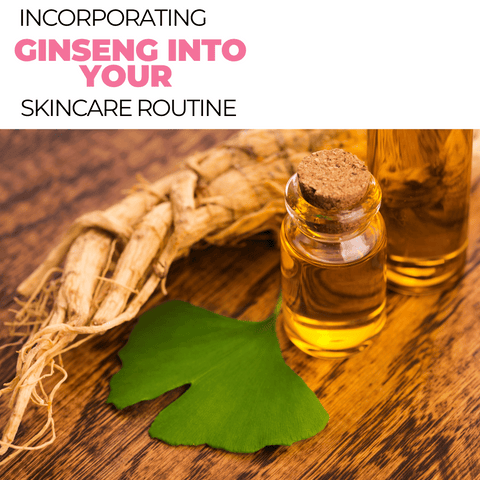
Incorporating ginseng into your skincare routine has the potential to give numerous advantages to the health and appearance of your skin. Here's a step-by-step method for incorporating ginseng-based products into your daily routine:
-
Cleaning: Begin by cleansing your skin with a gentle cleanser to remove dirt, makeup, and impurities. Cleansing prepares your skin for the products that follow.
-
Toning: Toner your skin with a hydrating and pH-balancing toner. Toning can help your skin absorb subsequent products better.
-
Ginseng-Based Serum or Essence: Ginseng-based products can be introduced at this stage. Look for serums or essences that contain ginseng extract or ginsenosides. These concentrated formulas can deliver the potential benefits of ginseng directly to your skin. Apply a small amount to your face and neck, gently patting it in.
-
Other Active Ingredients: If you are using other active ingredients such as Best vitamin C, hyaluronic acid, or retinoids, now is the time to apply them. Layering different activities should be done carefully to avoid overloading your skin.
-
Moisturiser: Apply a moisturiser to seal in moisture create a protective barrier. Ginseng's moisturising properties can aid in the maintenance of skin suppleness and hydration levels.
-
Eye Cream: Gently massage any ginseng-containing best under eye cream into the sensitive eye area. Here, ginseng's potential anti-inflammatory properties may be advantageous.
-
Sunscreen (Daytime Routine): Conclude your morning routine by applying a broad-spectrum sunscreen that has at least SPF 30. Sunscreen shields your skin from UV rays, which can damage and age your skin prematurely.
-
Night Cream: You can choose a slightly richer moisturiser or night cream for your nighttime routine. This helps to keep moisture in while your skin repairs itself while you sleep.
Tips and Considerations:
-
Patch Test: Before using any new product, particularly those containing active ingredients such as ginseng, perform a patch test on a small area of your skin to check for any adverse reactions or allergies.
-
Quality Products: Select reputable brands and products that contain a significant concentration of ginseng extract or ginsenosides. Check the ingredient list to make sure ginseng is included.
-
Consistency: Results from skincare products take time. Be consistent in your routine and give the products several weeks to show their effects.
-
Adjust as Needed: Monitor your skin's response. If you experience any irritation or adverse reactions, stop using the product. Everyone's skin is unique, so it's important to listen to your skin's needs.
-
Consult a Professional: If you have specific skin concerns or conditions, or if you are unsure how to incorporate ginseng into your routine, consult a dermatologist or skincare professional.
Choosing the Right Ginseng-Infused Skincare Products
Choosing the correct ginseng-infused skincare products entails taking into account a number of criteria to ensure that you are picking products that are effective, safe, and appropriate for your skin. Here's a checklist to help you make educated decisions:
-
Research and Ingredients:
-
Check the Ingredient List: Look for ginseng extract as an ingredient on the label. The higher up on the ingredient list, the higher the ginseng concentration is likely to be.
-
Types of Ginseng: Ginsengs with slightly varying qualities, such as Panax ginseng (Asian ginseng) or Panax quinquefolius (American ginseng), exist. Consider which form of ginseng best fits your skincare objectives.
-
Concentration and Quality:
-
Effective Concentration: Ginseng should be present in a meaningful concentration to provide potential benefits. Some products might only contain trace amounts of ginseng, which could limit their effectiveness.
-
Reputable Brands: Choose skincare products from trustworthy manufacturers that are known for their quality and transparency. Established brands typically have a reputation to uphold and are more likely to provide effective formulations.
-
Skin Type and Concerns:
-
Consider Your Skin Type: Different ginseng-infused products may be better suited for different skin types. For example, if you have oily skin, you might prefer a lightweight gel or serum. A richer cream or moisturiser might be advantageous for dry skin.
-
Targeted Concerns: Pick skincare products that address your particular issues. Choose products that emphasise ginseng's potential collagen-stimulating and antioxidant properties if you are looking for anti-aging advantages.
-
Reviews and Recommendations:
-
Read User Reviews: Learning about how well a specific ginseng-infused product has performed for other people can be gained from reading user reviews. However, remember that individual experiences can vary.
-
Consult Professionals: If you are unsure about which product to select, think about speaking with a dermatologist online or other skincare specialist. They can offer tailored advice based on the requirements and issues with your skin.
-
Patch Testing:
- Perform a Patch Test: Perform a patch test on a tiny area of your skin before putting any new product on your face, especially if you have sensitive skin or a history of allergies. This allows you to spot any negative responses before applying the product to your complete face.
-
Check for Additives:
- Avoid Harmful Additives: Examine the ingredient list for potentially dangerous additions such as perfumes, parabens, or sulphates that may irritate your skin. Look for products with simple ingredient lists.
-
Sun Protection:
- Daytime Use: If you use ginseng-infused products in your morning routine, couple them with a broad-spectrum sunscreen with an SPF of at least 30 to protect your skin from UV radiation.
-
Start Slowly:
- Introduce Gradually: When introducing new skincare products, especially ginseng-infused ones, ease them into your routine gradually. This helps your skin acclimatise and allows you to see how it reacts.
How to Effectively Use Ginseng for Optimal Skin Benefits
Follow these steps and tips to incorporate ginseng-infused products into your skincare routine for optimal skin benefits: patch test, choose quality products, cleanse, tone, apply ginseng-based serum or essence, layer with other actives (if applicable), moisturise, eye cream, apply sunscreen (daytime routine), and apply night cream (nighttime routine). Consistency is essential; watch your skin, alter as needed, and seek professional advice. Remember that, while ginseng may provide certain benefits, no single substance may solve all of your skincare problems. Creating a comprehensive skincare routine that includes cleansing, moisturising, sun protection, and other appropriate items will yield the best results for the health and appearance of your skin.
Safety and Considerations When Using Ginseng
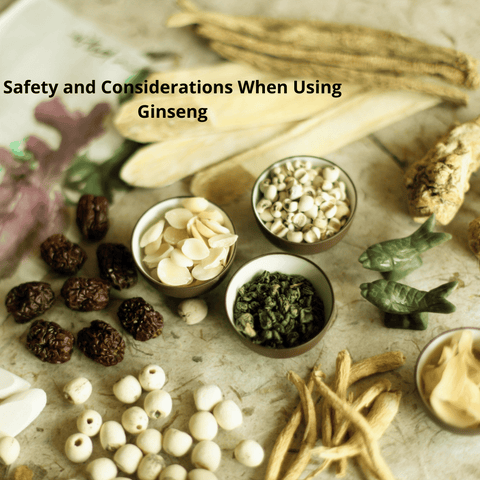
While ginseng is generally regarded as healthy for most individuals, there are some precautions to take when taking it, particularly in skincare. Allergies and sensitivities, skin type and sensitivity, interaction with other components, avoiding eye contact, sun sensitivity, visiting a dermatologist, quality, and source, gradual introduction, and pregnant and nursing folks are all key factors to consider. Patch testing, seeing a dermatologist, and using reputed brands can all contribute to a safe and happy experience with ginseng-based skincare. Always pay attention to your skin's response and adapt your routine as needed.
Possible Side Effects and Precautions of Ginseng
While ginseng is usually thought to be safe for most individuals when used in moderation, there are certain potential negative effects and precautions to be aware of while using it both internally (as a supplement or in teas) and topically (in skincare products). Consider the following crucial points:
-
Possible Side Effects:
-
Allergic Reactions: Ginseng may cause allergic reactions in certain people. Allergic responses can cause rashes, itching, swelling, and breathing difficulties. If you see any of these symptoms, stop using the product and seek medical attention.
-
Skin Irritation: When applied topically, ginseng-based skincare products may cause skin irritation in some people, particularly those with sensitive skin. It is recommended that you perform a patch test before applying the product to your face.
-
Digestive Issues: When taken orally, ginseng supplements or teas may cause stomach upset, diarrhoea, or nausea in some people.
-
Sleep Disturbances: Some people may experience sleep disturbances, restlessness, or insomnia after consuming ginseng, especially at higher doses or close to bedtime.
-
Blood Pressure: Ginseng can affect blood pressure levels. If you have high blood pressure or are taking blood pressure medications, talk to your doctor before using ginseng.
-
Drug Interactions:
-
Interactions with Medications: Ginseng may interact with some drugs, such as blood thinners, anticoagulants, and diabetes treatments. Consult a healthcare practitioner before consuming ginseng supplements or items if you are taking drugs, especially ones that affect blood coagulation or blood sugar.
-
Pregnancy and Breastfeeding:
-
Pregnancy: Ginseng should be used with caution by pregnant women. There is insufficient evidence of its safety during pregnancy, therefore it's best to see a doctor before taking ginseng pills or utilising ginseng products.
-
Breastfeeding: It is recommended that you consult a healthcare provider before using ginseng if you are breastfeeding, as there is insufficient data on its safety during this period.
-
Hormonal Effects:
-
Hormonal Effects: Ginseng has been shown to have hormonal effects on the body. Ginseng contains chemicals that can interact with hormone pathways. Consult a healthcare provider before using ginseng if you have hormonal abnormalities or illnesses such as hormone-sensitive malignancies.
-
Diabetes and Blood Sugar:
-
Blood Sugar Regulation: Ginseng may have an effect on blood sugar levels. If you have diabetes or are at risk of developing diabetes, use ginseng with caution and regularly check your blood sugar levels.
-
Dosage and Duration:
-
Moderation: When taking ginseng supplements, it is best to use them sparingly and according to the stated dosage guidelines on the product label. Long-term or excessive usage of ginseng supplements may have negative consequences.
-
Avoid Long-Term Use: Long-term usage of ginseng supplements without medical supervision is not advised. Consider taking ginseng supplement breaks to avoid potential adverse effects or interactions.
-
Consult a Healthcare Professional:
-
Individualised Advice: Before incorporating ginseng into your routine, consult a qualified healthcare provider if you have any underlying health conditions, are taking medications, or have concerns about using ginseng.
Understanding Your Skin Type and Ginseng Compatibility
Understanding your skin type is critical when deciding whether ginseng-based products will work with your skincare routine. Different skin types have different needs and sensitivities, and these considerations can determine how well ginseng works for you. Here's how to establish your skin type and whether ginseng is a good fit for you:
Skin Types:
-
Dry Skin: Characteristics: Dry skin is frequently tight, scratchy, or flaky. It may appear dull and lacklustre. Fine lines and wrinkles may be more visible.
-
Oily Skin: Characteristics: Excess sebum production in oily skin leads to a glossy appearance, increased pores, and probable acne problems.
-
Combination Skin: Characteristics: Combination skin is a combination of dry and oily patches. The T-zone (forehead, nose, and chin) may appear oilier, whereas the cheeks may appear drier.
-
Normal Skin: Characteristics: Normal skin is balanced, with only a few exceptions such as extreme dryness or oiliness. It has a smooth texture and a consistent tone.
-
Sensitive Skin: Characteristics: Sensitive skin is prone to irritation, redness, and allergic reactions to particular cosmetics or chemicals.
Ginseng Compatibility:
-
Dry and Mature Skin: Ginseng's possible moisturising and anti-aging effects may benefit dry and older skin. It may aid in the improvement of suppleness and the appearance of fine wrinkles.
-
Oily and Acne-Prone Skin: The ability of ginseng to balance oil production and reduce inflammation may assist oily and acne-prone skin. Look for compositions that are lightweight.
-
Sensitive Skin: Ginseng should be used with caution by people who have sensitive skin. Start with patch tests and products with lower ginseng concentrations.
Product Formulations:
-
Serums: Ginseng serums can provide concentrated advantages. Consider serums if you wish to address specific issues.
-
Moisturisers: Ginseng in moisturisers can provide hydration and support overall skin health.
-
Patch Testing: Perform a patch test on a small area of your skin to check for any adverse reactions or allergies before introducing any ginseng-based product into your routine.
-
Consult a Dermatologist: Consult a dermatologist if you are unsure about ginseng's compatibility with your skin type or have specific skin concerns. They can make personalised recommendations based on your skin's needs.
Looking Beyond Ginseng: Other Natural Anti-Aging Ingredients
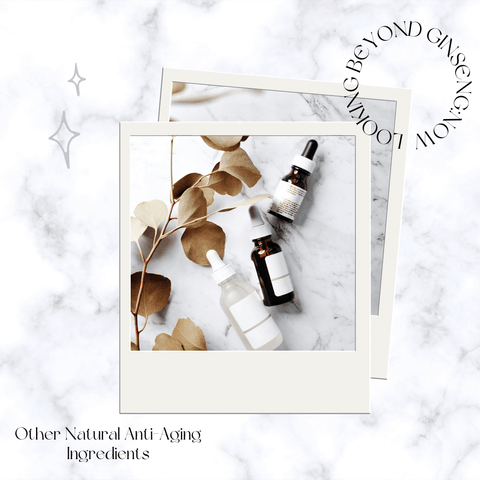
Yes, there are various other natural anti-aging compounds that can be used in conjunction with ginseng to create a well-rounded approach to skincare. Here are some well-known natural substances with anti-aging properties:
-
Hyaluronic Acid: Hyaluronic acid is a potent humectant that attracts and holds moisture, assisting in the plumping and hydrating of the skin. It can smooth out fine lines and wrinkles and promote a smoother complexion.
-
Retinoids (Vitamin A): Retinoids, which are produced from vitamin A, are well-known for their ability to boost collagen formation, improve skin cell turnover, and minimise the appearance of wrinkles and age spots. Because of the possibility of sensitivity, they should only be used under the supervision of a dermatologist.
-
Vitamin C: Vitamin C is an antioxidant that protects the skin from free radicals while also promoting collagen formation and brightening the complexion. It can also aid in the fading of hyperpigmentation and the improvement of skin texture.
-
Peptides: Peptides are short amino acid chains that can help in collagen formation and skin restoration. They are frequently used in anti-aging products to help with skin firmness and suppleness.
-
Niacinamide (Vitamin B3): Niacinamide is anti-inflammatory and can help reduce the appearance of enlarged pores, fine wrinkles, and uneven skin tone. It also helps to Niacinamide maintain the skin's barrier and moisture retention.
-
Coenzyme Q10 (CoQ10): CoQ10 is an antioxidant that promotes natural skin regeneration and protects against environmental stresses. It may reduce the visibility of fine lines and wrinkles.
-
Green Tea Extract: Green tea contains catechins, which are antioxidants with anti-inflammatory and anti-aging properties. Green tea extract can help protect the skin from UV damage and slow the aging process.
-
Rosehip Oil: Rosehip oil contains a high concentration of vitamins A, C, and E, as well as important fatty acids. It can aid in the improvement of skin texture, the reduction of scars and wrinkles, and the promotion of a more even skin tone.
-
Resveratrol: Resveratrol, found in red grapes and berries, is an antioxidant that has been linked to a variety of anti-aging properties, including UV protection and collagen formation.
-
Aloe Vera: Aloe vera contains soothing and moisturising characteristics that can help reduce inflammation, redness, and dryness, resulting in a younger appearance.
-
Shea Butter: Shea butter is high in vitamins and fatty acids, which give deep hydration and aid in the maintenance of skin suppleness. It can reduce the visibility of fine lines and wrinkles.
-
Licorice Root Extract: Because licorice root contains components that can help brighten and even out skin tone, it is useful for treating hyperpigmentation and age spots.
Complementary Ingredients for Anti-Aging Skincare
Developing an effective anti-aging skincare routine entails mixing complementary substances that work together to address different aspects of skin aging. Here are some substances that can be used with ginseng to provide comprehensive anti-aging benefits:
-
Ginseng + Hyaluronic Acid: Hyaluronic acid retains moisture and attracts, assisting in the hydration and plumping of the skin. When paired with the possible collagen-stimulating actions of ginseng, this combo can improve skin texture, minimise the appearance of fine wrinkles, and promote a more youthful appearance.
-
Ginseng + Vitamin C: Vitamin C is a powerful antioxidant that brightens the skin, increases collagen formation, and shields it from UV damage. Combining the antioxidative properties of ginseng with the ability of vitamin C to fight free radicals can result in enhanced skin tone, texture, and elasticity.
-
Ginseng + Peptides: Peptides are amino acid chains that aid in the creation of collagen and the restoration of skin. Combining ginseng's potential collagen-stimulating qualities with peptides can improve skin firmness and elasticity, reducing the appearance of wrinkles.
-
Ginseng + Niacinamide: Niacinamide (vitamin B3) reduces the appearance of fine wrinkles, uneven skin tone, and enlarged pores by acting as an anti-inflammatory. It can provide a more balanced approach to overall skin health and anti-aging concerns when combined with ginseng.
-
Ginseng + Retinoids: Retinoids (retinol, tretinoin) are vitamin A derivatives that promote cell turnover, stimulate collagen formation, and reduce wrinkle appearance. Ginseng's collagen-boosting properties can supplement retinoid benefits for enhanced skin texture.
-
Ginseng + Coenzyme Q10 (CoQ10): CoQ10 is an antioxidant that helps heal skin and protect it from environmental stresses. Ginseng combined with CoQ10 can boost the skin's defence mechanisms and promote healthy aging.
-
Ginseng + Green Tea Extract: Ginseng and green tea extract are both high in antioxidants, which help fight free radicals and UV damage. They provide a strong defence against oxidative stress, which contributes to accelerated aging.
-
Ginseng + Rosehip Oil: Rosehip oil is high in vitamins and fatty acids, which nourish and revitalise the skin. When paired with ginseng's ability to increase suppleness and tone, it can lead to a more youthful appearance.
-
Ginseng + Ceramides: Ceramides are lipids that aid in the maintenance of the skin's barrier and the retention of moisture. Ceramides, when combined with ginseng, can improve moisture and build the skin's protective barrier.
-
Ginseng + Antioxidant-Rich Ingredients: To boost ginseng's potential to protect the skin from free radicals and environmental damage, combine it with other antioxidant-rich substances such as resveratrol, vitamin E, and licorice root extract.
The Benefits of a Comprehensive Anti-Aging Skincare Routine
A complete anti-aging skincare regimen can provide numerous benefits that lead to healthier, younger-looking skin. When many beneficial components and practices are combined, a holistic approach that treats various elements of aging is created. Reduced appearance of fine lines and wrinkles, improved skin elasticity and firmness, brighter and more even skin tone, enhanced hydration and moisture retention, protection against environmental damage, improved skin texture and smoothness, strengthened skin barrier, minimised pore appearance, prevention of premature aging, boosted confidence, customised approach, and a self-care ritual are some of the key benefits of a well-rounded anti-aging skincare routine. Because individual reactions to skincare components vary, it's vital to be patient and give your routine time to work. If you're unclear about which products or substances to use, a dermatologist or skincare professional can provide personalised advice based on your skin's needs and issues.
The Future of Ginseng in Anti-Aging Skincare
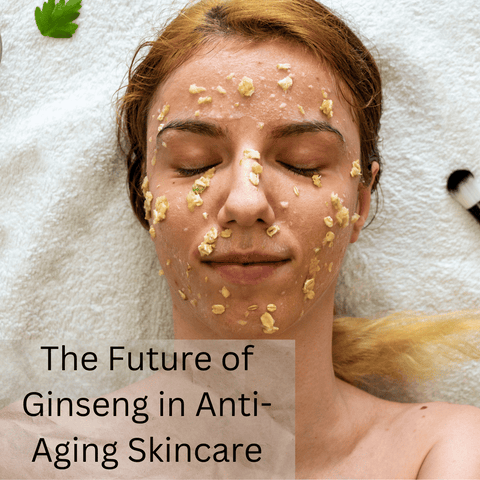
Ginseng's future in anti-aging skincare appears bright, as academics and skincare experts continue to investigate its potential advantages and develop creative formulations. Advanced formulations, customised skincare, hybrid ingredients, sustainable sourcing, clinical studies, amplified delivery systems, combining topical and oral use with cosmetic procedures, a focus on natural ingredients, and a holistic approach are some trends and possibilities for the future of ginseng in anti-aging skincare. While these possibilities are exciting, it is crucial to approach new skincare discoveries critically and informally. Research, clinical trials, and professional counsel should all be used to inform your decisions. Although the potential benefits of ginseng in anti-aging skincare are promising, individual results may vary, so maintaining a well-balanced and comprehensive skincare regimen is critical.
Innovations and Trends in Ginseng-Based Skincare
As the beauty industry investigates new ways to harness the potential advantages of this natural element, new innovations and trends in ginseng-based skincare emerge. Advanced extraction techniques, customised formulations, multi-ingredient complexes, sustainable sourcing, clinical research and efficacy studies, advanced delivery systems, combination products, tech-enhanced skincare, clean and green beauty, cross-cultural influences, collaboration with traditional medicine, and inclusion in wellness routines are some of the innovative directions and trends you can expect to see in ginseng-based skincare. Remember that the beauty industry is fluid, and trends can change quickly. Look for ginseng-based skincare products that are supported by reputable brands, have transparent ingredient lists, and ideally, have scientific research when shopping for such products. `1Consulting dermatologists or skincare professionals can help you navigate the changing environment of ginseng-based skincare advancements.
Why Natural Ingredients like Ginseng are Taking Centre Stage
In the skincare sector, natural ingredients like ginseng are gaining popularity for a number of compelling reasons:
-
Consumer Demand for Clean Beauty: Consumers are increasingly looking for products made with natural, plant-based components that reflect their desire for clean, sustainable beauty. Ginseng, for example, is a natural ingredient that resonates with this demand for transparency and environmentally conscientious choices.
-
Traditional Wisdom and a Holistic Approach: Natural ingredients have been used for centuries in traditional medicine systems all over the world. These ingredients frequently have historical significance and are regarded as gentle yet effective treatments, which attracts customers to the all-encompassing approach they offer.
-
Minimalism and transparency: Natural ingredients tend to have simpler formulations, which can appeal to consumers looking to simplify their skincare routines and reduce their exposure to synthetic chemicals. The transparency of natural ingredient lists fosters consumer and brand trust.
-
Anti-Aging Potential: Natural ingredients such as ginseng are high in antioxidants, vitamins, and other bioactive compounds that may have anti-aging properties. These ingredients promote skin health by promoting collagen production, protecting against free radicals, and promoting overall skin health.
-
Fewer Risks of Irritation: Synthetic and chemical ingredients can occasionally cause skin sensitivities and irritations. Natural ingredients like ginseng are generally considered gentler on the skin and have a lower risk of adverse reactions.
-
Customization and Personalization: Natural components can be adapted to specific skin types and issues, enabling personalised skincare treatments. This is consistent with the current trend of customised and personalised beauty regimes.
-
Cultural Influence and Globalisation: Natural ingredients frequently have cultural significance and heritage. As the beauty industry becomes more globalised, consumers are becoming more interested in ingredients from various cultures, such as ginseng from Eastern traditions.
-
Natural Formulation Innovation: The advancement of extraction techniques and formulation technologies enables brands to harness the full potential of natural ingredients while maintaining stability and efficacy.
-
Wellness and Self-Care Connection: Natural ingredients bridge the gap between skincare and wellness. Consumers are recognising the connection between self-care, inner well-being, and external beauty, and natural ingredients contribute to this holistic approach.
-
Long-Term Skin Health: Natural ingredients are frequently associated with promoting long-term skin health rather than just temporary cosmetic effects. This emphasis on nourishing and nurturing the skin resonates with consumers looking for environmentally friendly beauty practises.
-
Avoiding Controversial Ingredients: As consumers become more aware of ingredients that have raised concerns, such as certain synthetic chemicals, they are becoming more cautious. Natural ingredients such as ginseng offer alternatives that alleviate concerns about potentially hazardous substances.
Final Thoughts on Embracing Ginseng for a Youthful Glow
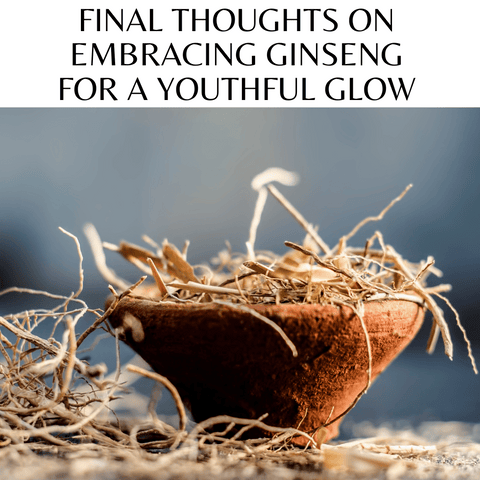
Including ginseng in your skincare routine might provide a number of possible benefits for obtaining a youthful glow. However, like with any skincare ingredient, it's critical to approach ginseng with caution and knowledge. Research and education, patch testing, quality matters, a balanced strategy, individual variability, consulting professionals, listening to your skin, a holistic lifestyle approach, embracing self-care, and a long-term attitude are some final considerations to ponder. Incorporating ginseng into your skincare routine can help improve the health of your skin and promote a youthful appearance. Finally, embracing practices and substances that resonate with you and contribute to your general well-being is key to achieving a youthful glow.
































